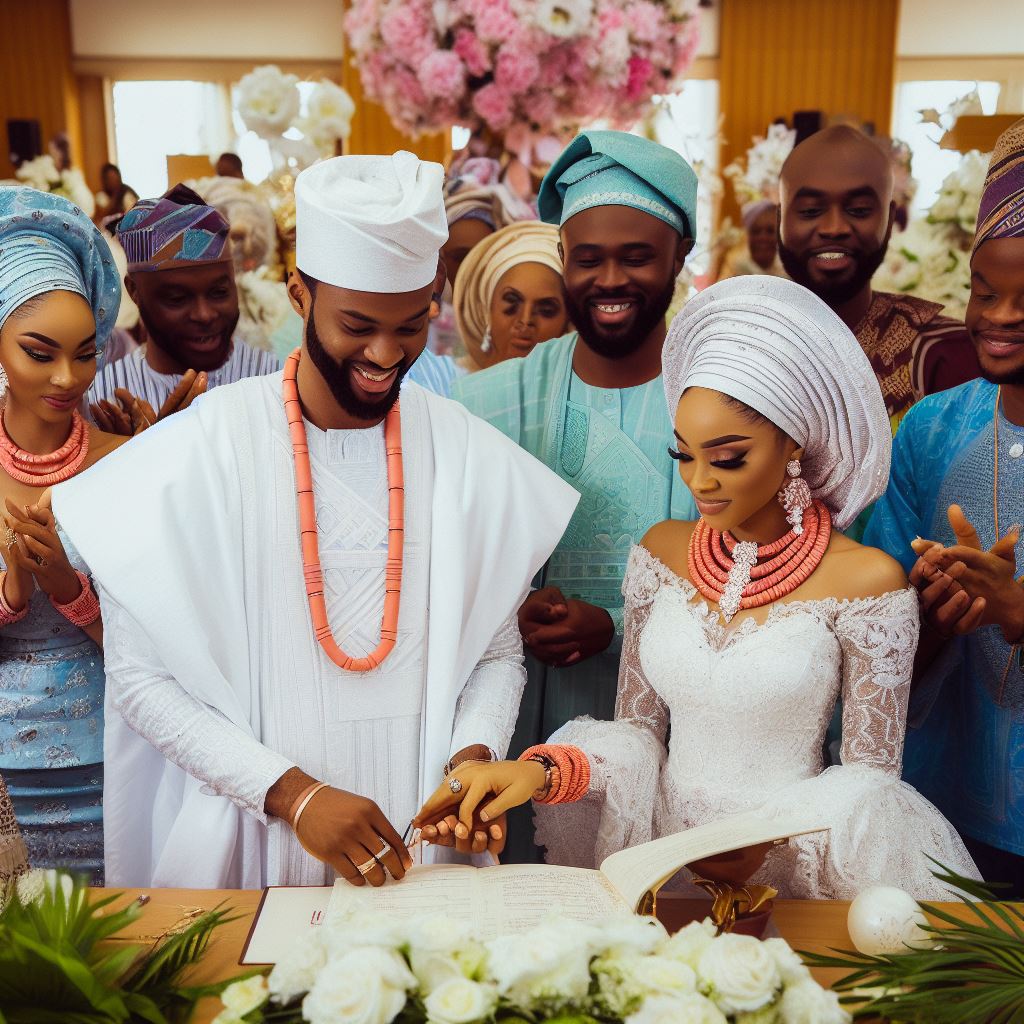Marriage Act Nigeria: Addressing Common Misconceptions
Last Updated on January 28, 2024
Introduction
Misconceptions can often arise surrounding various aspects of the Marriage Act in Nigeria.
While it is crucial to ensure accurate information is available, debunking these misconceptions is equally important.
Through this blog post, we will shed light on some of the most common misunderstandings surrounding the act.
One such misconception is that the Marriage Act in Nigeria only recognizes marriages conducted in religious institutions.
However, this is far from the truth.
The act legally recognizes both religious and civil marriages, and individuals can choose the type of ceremony that aligns with their beliefs.
Another prevalent misconception is that the Marriage Act restricts the age at which individuals can get married.
Contrary to this belief, the act sets a minimum age requirement for marriage, which is 18 years for both males and females.
It is important to stress that child marriages are not legal under the Marriage Act.
Furthermore, some individuals mistakenly think that the Marriage Act only applies to those who follow traditional customs or are part of the indigenous tribes in Nigeria.
This is not accurate as the act is applicable to all residents of Nigeria, regardless of their cultural background.
By addressing these misconceptions and providing accurate information, we hope to foster a better understanding of the Marriage Act in Nigeria.
It is essential for all individuals to have access to credible and reliable knowledge concerning this topic.
Overview of the Marriage Act in Nigeria
When it comes to marriage in Nigeria, the Marriage Act is of utmost importance.
This act provides the legal framework and guidelines for marriage in the country.
The Marriage Act and its purpose
The Marriage Act is a legislation that governs the solemnization and registration of marriages in Nigeria.
Its primary purpose is to regulate and ensure the legality of marriages in the country.
According to the act, a marriage is a voluntary union between a man and a woman, with the intention of being married for life.
It recognizes both civil and customary marriages, as long as they comply with the provisions outlined in the act.
The act helps protect the rights and interests of parties involved in a marriage, as well as the welfare of any children born within the union.
It sets forth rules regarding the age of consent, capacity to marry, and the procedures for conducting a valid marriage.
When the act was enacted and its legal implications
The Marriage Act was enacted on 27th August 1914, during the colonial era in Nigeria.
It is a product of British influence and has since been revised to reflect changes in societal norms and practices.
Legally, the Marriage Act is binding on all citizens of Nigeria, regardless of their religion or tribe.
It provides a uniform legal framework for all marriages in the country, regardless of cultural or customary differences.
One of the key legal implications of the act is the requirement for marriage registration.
According to the act, all marriages must be registered within a specific timeframe after the solemnization.
Failure to do so can render the marriage null and void.
It also stipulates that marriages conducted outside Nigeria must be in accordance with the law of the country where the marriage took place.
It recognizes marriages solemnized by authorized individuals such as religious leaders, marriage registrars, or other recognized officers.
Relevance of the act in contemporary Nigerian society
The Marriage Act continues to play a significant role in contemporary Nigerian society.
It provides a legal framework that ensures the protection of individuals involved in a marriage.
One of the notable contributions of the act is the prevention of child marriage.
It sets the minimum age for marriage at 18 years old, ensuring that individuals have the maturity and capacity to consent to marriage.
Furthermore, the act addresses issues such as polygamy, divorce, and property rights, which are crucial in safeguarding the rights and interests of spouses and children within a marriage.
The act also serves as a tool for promoting gender equality, as it does not discriminate between male and female spouses.
It ensures that women have legal rights within the marriage, including the right to own property and access to divorce.
Generally, the Marriage Act in Nigeria holds immense significance in regulating marriages and protecting the rights of individuals involved.
It provides a legal framework that is essential for a harmonious society and ensures the welfare of families.
Read: Legal Requirements for Valid Marriages Under Nigerian Law
Marriage Act only applies to Christian marriages.
A common misconception about the Marriage Act in Nigeria is that it only applies to Christian marriages.
However, this is far from the truth, as the act applies to all marriages in Nigeria, regardless of religious affiliation.
Clarifying the applicability of the act
It is essential to clarify the misconception and make it clear that the Marriage Act applies to everyone.
This includes individuals of different religious backgrounds, such as Muslims, traditional worshippers, and members of other faiths or belief systems.
By emphasizing the inclusivity of the Marriage Act, we discourage the false notion that it exclusively caters to Christian marriages.
All couples intending to tie the knot in Nigeria should familiarize themselves with the act’s provisions.
Examples of non-Christian marriages falling under the act
There are several instances of non-Christian marriages that fall within the purview of the Marriage Act.
For example, Islamic marriages conducted under Sharia law can align with and benefit from the act.
Similarly, marriages conducted under traditional customs and beliefs are also recognized and protected under the Marriage Act.
The act provides a legal framework to safeguard the rights and interests of couples, irrespective of their religious or cultural practices.
Importance of understanding the act’s applicability
Having a clear understanding of the Marriage Act’s applicability is crucial to avoid misunderstandings and misconceptions.
Lack of awareness about the act’s reach can lead to confusion, disputes, and unnecessary complexities in marital matters.
Sense of security and legal protection
Understanding that the act applies to all marriages provides a sense of security and legal protection for all couples.
It ensures that the rights and obligations of spouses are clearly defined and upheld, regardless of their religious beliefs.
Failing to recognize the act’s applicability to non-Christian marriages may result in individuals unknowingly neglecting their legal rights and entitlements.
This highlights the necessity of educating people about the wide-ranging scope of the Marriage Act.
Serves as a unifying force
Furthermore, the act serves as a unifying force, fostering equality and harmonious coexistence among diverse religious communities.
It reinforces the idea that marriage is a fundamental institution that transcends religious boundaries, emphasizing the shared commitment and responsibilities of couples.
Essentially, the misconception that the Marriage Act in Nigeria exclusively applies to Christian marriages is unfounded.
The act is applicable to all marriages, regardless of religious affiliation, and provides a comprehensive legal framework to protect couples’ rights and interests.
By clarifying the act’s inclusivity, providing examples of non-Christian marriages falling under its purview, and stressing the importance of understanding its applicability, we can dispel misunderstandings and promote a more informed and unified society.
Read: The Role of Witnesses in Statutory Marriages: Nigeria’s Perspective
Marriage Act promotes monogamy exclusively
The act recognizes both monogamous and polygamous marriages
In Nigeria, the Marriage Act is often misunderstood as promoting exclusive monogamy.
However, a closer look at the act reveals that it recognizes both monogamous and polygamous marriages.
This misconception arises from a lack of awareness and accurate information about the provisions of the act.
The Marriage Act clearly provides for the recognition of both monogamous and polygamous marriages.
It does not favor one over the other.
This recognition is important because it acknowledges the cultural and religious practices in Nigeria where polygamy is accepted.
Legal requirements and considerations for entering into polygamous marriages under the act
For those considering entering into polygamous marriages, the Marriage Act sets out specific legal requirements and considerations.
These requirements include providing evidence of the ability to maintain multiple wives financially and ensuring that the wife provides her consent to the proposed marriage.
Failure to meet these requirements can lead to legal consequences and potential invalidation of the marriage.
It is essential for individuals to have accurate information about the Marriage Act to understand its provisions correctly.
Misinterpretation of the act can lead to misunderstandings and misconceptions about the legality and consequences of polygamous marriages.
Consulting legal professionals or referring to official government sources can help obtain accurate information about the act.
The need for accurate information to avoid misinterpretation of the act
Additionally, accurate information can help individuals make informed decisions about their marital choices.
It allows them to understand the rights and responsibilities associated with both monogamous and polygamous marriages.
This knowledge is crucial for individuals to make choices that align with their values, beliefs, and circumstances.
Misconceptions about the Marriage Act can also contribute to stigmatization and discrimination against those in polygamous marriages.
By promoting accurate information and challenging misconceptions, society can foster a more inclusive and respectful environment for individuals with diverse marital choices.
In general, the Marriage Act in Nigeria recognizes both monogamous and polygamous marriages.
It is crucial to debunk the misconception that the act promotes exclusive monogamy and to disseminate accurate information about its provisions.
This will enable individuals to make informed decisions about their marital choices and foster a more inclusive society that respects diverse family formations.
Read: Marriage Registration in Nigeria: A Step-by-Step Guide

Marriage Act discourages traditional and cultural practices.
Respecting and Accommodating Traditions
The Nigerian Marriage Act, contrary to a common misconception, doesn’t stifle our rich cultural tapestry. In fact, it respects and accommodates traditional practices.
- Recognition of Traditions: The Act recognizes the significance of our diverse cultures and allows couples to incorporate them into their ceremonies.
- Ceremonial Flexibility: Traditional wedding ceremonies can coexist with the legal marriage, offering couples the freedom to follow their cultural norms.
- Diverse Attire: The Act does not dictate what to wear, letting couples embrace traditional attire that reflects their heritage.
Customary Law Provisions
The Act also incorporates customary law provisions, ensuring a harmonious blend of tradition and legal requirements.
- Customary Ceremonies: It acknowledges that customary weddings can precede or accompany the statutory marriage.
- Consent and Custom: Customary consent practices are upheld, aligning with the essence of consent in traditional contexts.
- Inheritance Rights: Spouses can maintain inheritance rights, respecting customary laws regarding inheritance and succession.
Recognizing Traditional Practices
To further emphasize this point, here are examples of how the Marriage Act recognizes and integrates traditional practices:
- Bride Price: The Act respects the customary practice of bride price, allowing couples to include it in their marriage.
- Religious Ceremonies: Couples are free to conduct religious rituals in tandem with their legal wedding.
- Traditional Rites: Customary rites can be carried out, ensuring that they don’t contravene statutory laws.
In essence, the Marriage Act in Nigeria isn’t a hindrance to our rich traditional practices; it’s a framework that acknowledges and embraces our cultural diversity while providing legal protection to couples. It’s the bridge between tradition and modernity.
Read: Bigamy and the Marriage Act: What Every Nigerian Should Know
Marriage Act restricts the rights of women.
The misconception that the act is biased against women.
- Contrary to popular belief, the Marriage Act in Nigeria does not discriminate against women.
- It is essential to clarify the misconceptions surrounding this topic to ensure an accurate understanding.
- Some people mistakenly assume that the act favors men while overlooking the provisions that protect women’s rights.
- By addressing this misconception, we can promote a more informed and balanced discussion on the Marriage Act.
- It is crucial to recognize that the act aims to ensure gender equality and safeguard the interests of both spouses.
The provisions within the act that protect women’s rights in marriage
- The Marriage Act explicitly prohibits child marriage, setting the minimum age for marriage at 18 years for both sexes.
- This provision ensures that young girls are not forced into early and potentially harmful marriages.
- This act also protects women by requiring consent from both parties before a marriage takes place.
- Women are given the right to freely choose their partners and have a say in critical decisions related to their marriage.
- The act also outlines the legal framework for the dissolution of marriage and ensures fair treatment for women in the process.
How the act promotes gender equality and safeguards women’s interests
- The Marriage Act attests to Nigeria’s commitment to gender equality by providing equal rights and protections for both men and women.
- It recognizes that women should have the same freedom to make decisions regarding their marriages as men.
- This act reinforces the idea that women should not be treated as subordinate to men within the institution of marriage.
- It prohibits discriminatory practices and ensures that both spouses have equal rights and responsibilities in their marital union.
- The Marriage Act is a crucial step towards fostering gender equality and promoting women’s empowerment in Nigerian society.
In short, it is vital to dispel the misconception that the Marriage Act in Nigeria restricts the rights of women.
This act, in fact, contains provisions that protect women’s rights in marriage.
It promotes gender equality by ensuring that both men and women have equal rights and responsibilities.
By debunking this misconception, we can create a more accurate understanding of the act’s purpose and
Delve into the Subject: Religious-Inspired Wedding Blessings for Friends
Conclusion
Recap the Main Points
In this blog, we unraveled the Marriage Act in Nigeria, dispelling myths surrounding it.
We clarified its legal provisions.
Reinforce the Importance
Understanding the Marriage Act is crucial.
Misconceptions can lead to legal problems and disputes. Knowledge is power.
Encourage Seeking Accurate Information
Don’t rely on hearsay.
Consult legal professionals for clarity on the Marriage Act’s intricacies.
Accurate information safeguards your future.
Misconceptions about the Marriage Act can have far-reaching consequences.
It’s vital to understand its provisions to ensure a smooth and legally sound marriage in Nigeria.
Seek accurate information and consult legal professionals when necessary.
Don’t let misconceptions cloud your understanding of this critical legal document.
Knowledge empowers you to make informed decisions regarding your marriage, protecting your rights and interests.
In the digital age, misinformation spreads quickly, but accurate legal guidance is your shield against potential pitfalls.
Embrace the wisdom that comes from knowing the Marriage Act inside and out, ensuring your marriage journey is grounded in legality and security.
So, arm yourself with knowledge, consult experts when needed, and embark on your marital journey with confidence and clarity.


